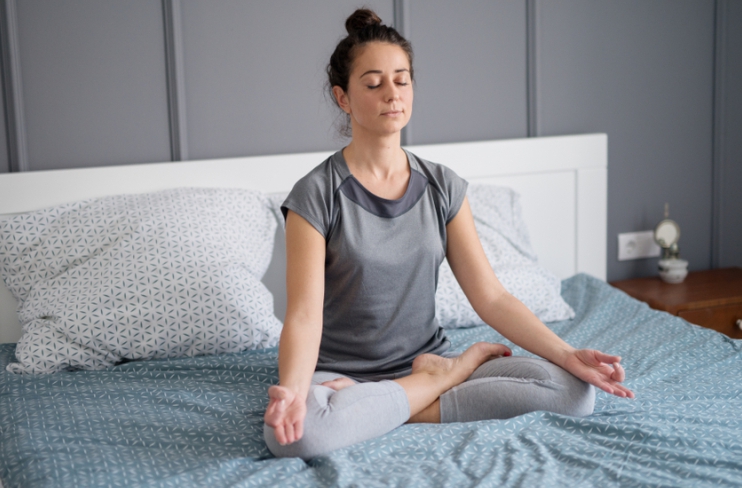Meditation For Sleep – The Secret to a Deep Good Night’s Slumber
Regular practice of meditation for sleep helps you enjoy a good night’s sleep. For centuries the practice of meditation helped millions connect with their deeper selves. Hence, meditation for sleep has been a useful tool for all those looking to create inner harmony and remains calm amidst the chaos. Further, it helps you remain in the present moment.
Meditation offers a host of other benefits including lower blood pressure, less anxiety, a decrease in body pain, and fighting depression. Hence, it is the perfect option for those on the path to spiritual enlightenment and stillness at the moment.
Inculcating regular practice of meditation into your daily schedule helps you remain calm in stressful situations. Moreover, there are specific Yoga Alliance certified schools that can help you kick start the journey towards inner peace.
Do you know that meditation is not only about sitting cross-legged and trying to concentrate on peaceful and positive thoughts? It requires tons of patience and constant practice to maintain the streak.
Let us first understand the different types of meditation practices.
Meditation for Sleep – Different Types of Meditation
Meditation includes the practice of thinking deeply and focusing the mind on a particular object. Furthermore, you can take up meditation for sleep in silence or by chanting a Mantra. Meditation is a practice found in religions and customs throughout the world.
Let us now understand what each type of meditation practice does.
1. Mindfulness Meditation
Mindfulness meditation requires you to be fully present with every type of thought. You are completely aware of the present moment, what you are doing without any reaction or judgment. Therefore, mindfulness meditation is a much-preferred way of meditation for sleep methods that you can do while sitting in a quiet place and focusing on breathing.

In mindfulness meditation, you observe your thoughts and emotions without passing any sort of judgment.
2. Vipassana Meditation
Vipassana is an ancient form of meditation that helps you see things as they really are. It has been a part of the Indian tradition for more than 2500 years. Vipassana meditation offers you a chance at self-transformation using the powers of observation.
However, it takes discipline and practice to pay attention to the physical sensations in the body and establish a greater connection between the mind and body. The interconnection lets you achieve a total balance of self-love and compassion.
With Vipassana meditation, you need to undergo at least 10 days of training and abstain from every intoxicant and negative activity.
3. Yoga Meditation
Perhaps the best meditation for sleep technique is yoga meditation. Yoga meditation has been a part of the Indian tradition for thousands of years. The meditation includes the practice of specific asanas and postures with the right breathing under the tutelage of an experienced teacher.
You develop not only a calm mind but also gain total control over body movements owing to regular concentration and practice.
4. Transcendental Meditation
Transcendental meditation practice is simple. You need to repeat a particular word, sound, phrase, or mantra in a specific manner. This meditation for sleep method requires at least 20 minutes of practice every day with closed eyes.
Transcendental meditation helps you accomplish the goal of inner peace without any effort or concentration.
5. Guided Meditation
Guided Meditation, also known as guided imagery or visualization requires you to form a mental picture of a situation you find peaceful and relaxing. You practice this form of meditation under the guidance of a teacher.

Guided meditation requires that you make use of all senses including smell, sound, and even textures to make the mind calm and peaceful.
6. Metta Meditation
Also known as Loving-Kindness Meditation, Metta meditation is done with the intention of sending positive energy towards others. You need to recite words and phrases that bring out warm feelings. The Metta Meditation practice takes place usually in a comfortable and relaxed position. Practice this meditation for sleep to send out good wishes to loved ones in your life.
7. Chakra Meditation
Chakra is a Sanskrit word meaning “wheel” and has its roots in India. It basically refers to different energy centres and spiritual power inside the body. The human body has a total of 7 Chakras with each located in different parts of the body and having a corresponding colour.
Chakra meditation is an effective meditation for sleep practice to bring about total balance to the body and mind. You can utilize light incense, or crystals matching the colours of the Chakra during the meditation practice.
8. Movement Meditation
The majority of meditation for sleep positions require you to sit still but not movement meditation. For example, walking meditation is a form of movement meditation and is associated closely with Tai Chi and Yoga.
Movement meditation helps you expand your consciousness by simply being present during any type of movement be it a morning walk, or playing sports. You can combine movement meditation with mindful sitting meditation for the best results.
9. Progressive Meditation
The Progressive Meditation, also known as Body Scan Meditation is an effective meditation for sleep practice that helps you reduce the tension inside the body and remain in a relaxed state. It involves tightening and relaxing of one muscle group throughout the body.
Progressive Meditation also helps you create a gentle wave of energy flow through the body. It helps you relieve stress and relax before bedtime.
We all know that a hectic lifestyle leaves minimal time for us to dive deeper into meditative practices.
Meditation for Sleep – Tips to Start Daily Meditation Practices
Given below are specific tips which help you build on a regular meditation for sleep practices with ease.
1. Start With Less
Although meditation for sleep is a great idea it does not mean you need to sit in a 30-minute meditation session. You would not feel mindful or calm during the starting days. Just try to sit still with the thoughts for five minutes. A meditation session of 10 to 15 minutes daily can also help you become more peaceful over time.
2. Feel Comfortable
The age-old photos of people sitting in the lotus position might have enticed you but it is not for everyone. Practising meditation for sleep can include sitting in an uncomfortable position which only interferes with the session.
Fortunately, when starting out the meditation practice you need not sit in a specific position to meditate. You can also meditate during a walk or standing as simple breathing can also get the job done.
3. Keep Practicing
You need to accept that it takes time to adapt to a new habit and not worry if the meditation practice does not work out in the beginning. Try to find out where you are failing when it comes to practising meditation and keep an open mind.
4. Find the Right Time
You would know that meditation for sleepsuits at different times for every individual. Your ideal time to practice meditation is whatever works for your schedule. If you try meditating at the wrong time then it only leads to irritation and frustration.
5. Search for Meditation App
Your smartphone is an asset when it comes to searching for the best application. Why not use it to help you find the best meditation for your sleep routine? There are applications that can help you meditate with features as nature and calming sounds, proper breathing techniques, and techniques for the right meditation.
The popularity of meditation offers multiple benefits as is evident from millions taking a liking to its practice. The practice of meditation for sleep trains the mind by keeping it focused on the present and reflecting on the thoughts.
Meditation for Sleep – The Reasons to Practice
The benefits of meditation far outweigh helping your mind and body relax. Meditation helps you increase the awareness of yourself and your surroundings. It helps you reduce unnecessary stress and develop better concentration.
With that said, given below are the seven major benefits of practising meditation.
1. Less Stress
A common reason why people meditate is due to the stress of daily life. Mental or physical stress leads to the production of the stress hormone Cortisol. Cortisol leads to the production of inflammation-promoting chemicals as cytokines.
Unnecessary stress leads to you suffering from health issues as depression, anxiety, and increased blood pressure. The meditation for sleep helps counter stress-related conditions like Irritable Bowel Syndrome, Fibromyalgia, and PTSD (Post Traumatic Stress Disorder).
2. Better Emotional Health
Specific forms of meditation help you develop a healthy self-image and a positive outlook towards life. The practice of mindfulness meditation helps reduce the production of inflammation chemicals Cytokines. You develop positive thinking and an optimistic outlook towards life.
3. Increased Attention Span
With focused meditation for sleep, you can increase the timing of attention. Regular meditation helps in removing patterns in the brain associated with worry and a poor attention span.
4. Helps Fight Addictions
Practising meditation for sleep, in the long run, helps you break the dependency on addictive behaviors and develop more awareness. It helps you redirect the attention and gain more control over emotions thereby getting to the cause of the addictive behaviour. You also gain control over food cravings that ensures good health in the long run.
5. Better Sleep
The stress of daily life gets to you at one point or another. Insomnia is the most common problem amongst a majority of the population these days. You might not know but meditation for sleep helps you fall asleep within a short period of time as compared to other forms of exercise.
6. Helps Control Pain
How you perceive pain is directly related to the state of mind as a stressful event can elevate a small pain to phenomenal levels. Yoga techniques as mindfulness meditation help decrease chronic or intermittent pain.
7. Reduces Risk of Age-Related Memory Problems
Various studies have shown how meditation for sleep helps a person in developing clarity of thoughts and improved attention span. You can practice Kirtan Kriya meditation that requires a mantra or chant with repetitive motion of the fingers to focus. Meditation is also helpful in helping those with dementia improve their memory power.
Mentioned above are the numerous reasons why taking up meditation for sleep is the way out from all the stress of daily life. There are specific meditation techniques that beginners can utilize to enjoy a more peaceful life.
Also Read: Why You Should Join Yoga Teacher Training in Rishikesh?
Meditation for Sleep – 6 Beginner Meditations for a Deep Sleep
If mental and physical relaxation is the end goal then proper breathing is your best friend. Controlled breathing lowers Cortisol levels, which are the stress hormones. Let us now understand the five different meditation methods to help you sleep soundly every night.
1. Yoga Teacher
There is nothing more relaxing and comforting than practising meditation for sleep under the guidance of experienced teachers. Hence, an experienced yoga teacher offers you the best schedule for exercise and diet to take up meditation as a beginner and take it to advanced levels.
2. Guided Meditation App
In case you are just new to the area of meditation for sleep then search for the best smartphone applications to guide you on this journey. Moreover, many applications also offer you specific meditation techniques to counter stress and anxiety.
3. Exhale Longer than Inhale
Breathing work during meditation offers many therapeutic effects. Further, there are hundreds of meditation techniques you can inculcate for deep breathing through the nose. Also, a way to practice this particular technique is to remember – The slower you breathe, the quieter the mind becomes.
4. Add Some Visualization
You can also add some visualization when practising meditation for sleep with the right breathing technique. It offers a powerful way to fight combat and stress that keeps you relaxed and calm down the body.
5. Practice a Bedtime Mantra
If you are just starting out the meditation for sleep practice then including a specific mantra would help you dive deeper into keeping a relaxed mind. However, make sure to repeat the mantra with each inhale and let it regulate the breathing.
6. Include the 2:1 and 4:1 Breathing Technique
An effective method of practising meditation is inhaling on the count of two, holding the breath for one second, exhaling slowly on the count of four, and finishing it by holding the breath for one second. Moreover, you need to find a breathing pattern that is suitable for the practice.
However, there is still one secret that you have not unlocked when it comes to enjoying a good night’s sleep. Let us talk about the concept of Yoga Nidra.
Meditation for Sleep – Yoga Nidra and Sleep
Yoga Nidra, also known as Yogic sleep is an effective meditation for sleep technique that helps your body relax. Thus, it helps restore your sleep by keeping the body and mind completely relaxed and calm.
Let us now concentrate on how Yoga Nidra helps you enjoy a deep good night’s sleep without any issues.
1. Better Sleep and Reduced Insomnia
A lack of sleep is the leading cause of insomnia and restless nights. Yoga Nidra is important for you to get a relaxed sleep every night else it can lead to a weaker immune system. Hence, including this form of meditation for sleep yoga poses helps you fall asleep faster.
2. Let Go of Tension and Pain
Yoga Nidra helps you become aware of the stress and worries of everyday life. Further, it helps you work on mental health issues as depression, and anxiety. Your quality of life improves, not to forget better well-being. Also, if it comes to choosing a meditation for sleep technique to find mental and physical relaxation; choose Yoga Nidra.
3. Enjoy Life to the Full
The regular practice of Yoga Nidra helps you in making changes to your lifestyle and other routines. You develop a different perspective towards the world that includes feelings of happiness, and appreciation.
Yoga Nidra helps enhance your perspective on life and create a better work-life balance. Hence, it brings more peace of mind into daily life.
4. Detach from the Thoughts
The reason why Yoga Nidra is amongst the best meditation for sleep techniques is it helps you make a peaceful nature the normal state of mind. You learn to integrate mindfulness into everyday life.
5. Connect With Your Authentic Self
Including meditation for sleep in the daily routine helps you focus much on health and wellness. Yoga Nidra provides you with total freedom by overcoming stress and anxiety. Also, you start to release pent-up energy and experience positive emotions. Moreover, meditation offers you the best opportunity to face negative thoughts and bring more positivity into your life.
The Conclusion
Inculcating meditation for sleep provides you a way to remain calm amidst the chaos. Moreover, you learn to become more aware and more accepting of inner feelings. Further, meditation is the perfect tool to help you gain a better understanding of the inner working of the mind. Hence, it helps you remain grounded at the moment and focus on your feelings. It is time to let go of all the negativity and embrace life with open arms.
Read more: Detailed Syllabus For 200 Hour Yoga Teacher Training
FAQs
Ques 1) How do I meditate to sleep?
Ans) To begin a meditation practice, you need to choose a dark, cool, and comfortable place. Further, make sure that there is no disturbance. Moreover, you need to close your eyes just like you are about to sleep. Then you can keep your attention on your breath until your body falls asleep. Make sure you do not sleep and be conscious of what you are thinking.
Ques 2) What are the 3 types of meditation?
Ans) There are hundreds of types of meditation practices. However, the most simple and easy to do are as follows. You can begin meditation practice with breathing meditation, visualization, and mindfulness meditation. There are the top three meditation practices that you can do.
Ques 3) What should I focus on while meditating?
Ans) You do not need anything to focus on while meditating. In fact, that is the sole purpose of meditation. However, if you want to, you can focus on a source of light. For instance, a candle flame or an incense stick can work perfectly for you. Moreover, you can also concentrate on a sound coming from a distance. Also, you can shuffle between different sources to keep things interesting.









